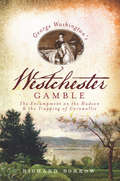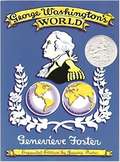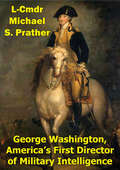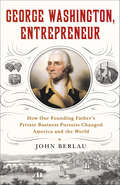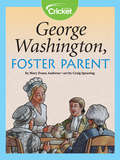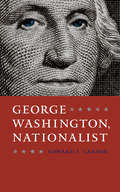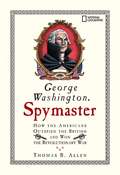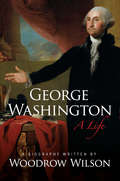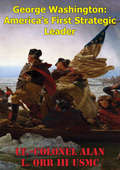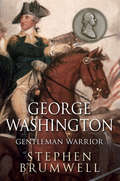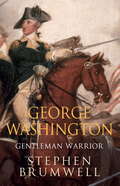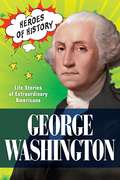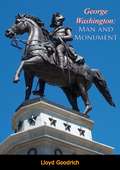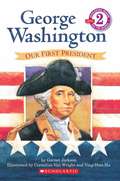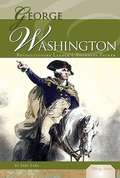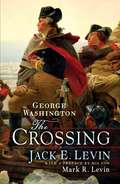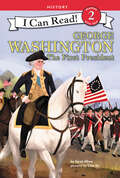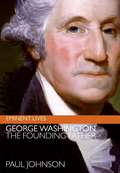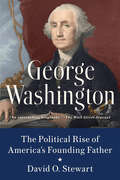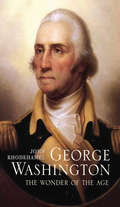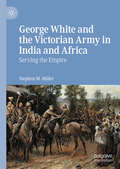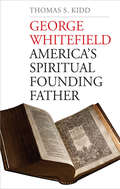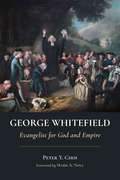- Table View
- List View
George Washington's Westchester Gamble: The Encampment on the Hudson & the Trapping of Cornwallis
by Richard BorkowA look at Westchester County’s place in the American Revolution and Washington’s plan to trick Cornwallis and march to Yorktown.During the summer of 1781, the armies of Generals Washington and Rochambeau were encamped in lower Westchester County at Dobbs Ferry, Ardsley, Hartsdale, Edgemont, and White Plains. It was a time of military deadlock and grim prospects for the allied Americans and French. Washington recognized that a decisive victory was needed, or America would never achieve independence. In August, he marched these soldiers to Virginia to face General Cornwallis and his redcoats. Washington risked all on this march. Its success required secrecy, and he prepared an elaborate deception to convince the British that Manhattan, not Virginia, was the target of the allied armies. Local historian Richard Borkow presents this exciting story of the Westchester encampment and Washington’s great gamble that saved the United States.Praise for George Washington’s Westchester Gamble“Borkow has done a first-rate job of telling the story of the American Revolution in Westchester County and putting dramatic events there in the context of the larger war--especially the decision to march to Yorktown.” —Thomas Fleming, author of The Perils of Peace“Just when it seemed that the subject of the American Revolution had been thoroughly explored, Richard Borkow has given us a fresh look at the war's culminating event—the 1781 march of French and American troops to Virginia.” —Joseph Wheelan, author of Jefferson’s War and Mr. Adams’s Last Crusade
George Washington's World
by Joanna Foster Genevieve FosterFoster's telling of the life story of George Washington does justice to the man it celebrates.
George Washington, America's First Director Of Military Intelligence
by L-Cmdr Michael S. PratherGeorge Washington, as Commander-in-Chief of the Continental Army led this nation to victory and independence in the American Revolution. Victory was facilitated by his direct and effective use of intelligence sources and methods.During the American War for Independence, intelligence information regarding location, movement, and disposition of British forces allowed the Continental Army to fight on its own terms and stymie British efforts to quell the revolution. General George Washington, as Commanding General of the Continental Army, was aware of the value of intelligence in the proper conduct of military operations. Washington literally became America's first director of military intelligence. He directed the operations that were conducted, and performed his own analysis. The Continental Army's effectiveness in intelligence includes examples of the proper use of espionage, counterintelligence, communications security, codebreaking, deception, operational security, surveillance, reconnaissance, reporting and analysis. Time after time, the Americans were properly prepared with good intelligence ultimately resulting in independence from the British. These intelligence successes can be directly attributed to the direction of George Washington and the actions of his operatives.
George Washington, Entrepreneur: How Our Founding Father's Private Business Pursuits Changed America and the World
by John BerlauA business biography of George Washington, focusing on his many innovations and inventions.George Washington: general, statesman...businessman? Most people don't know that Washington was one of the country's first true entrepreneurs, responsible for innovations in several industries. In George Washington, Entrepreneur, John Berlau presents a fresh, surprising take on our forefather's business pursuits.History has depicted Washington as a gifted general and political pragmatist, not an intellectual heavyweight. But he was a patron of inventors and inveterate tinkerer, and just as intelligent as Jefferson or Franklin. His library was filled with books on agriculture, history, and philosophy. He was the first to breed horses with donkeys to produce the American mule. On his estate, he grew countless varieties of trees and built a greenhouse full of exotic fruits, herbs, and plants. Unlike his Virginia neighbors who remained wedded to tobacco, Washington planted seven types of wheat. His state-of-the-art mill produced flour which he exported to Europe in sacks stamped "G. Washington"—one of the very first branded food products. Mount Vernon was also home to a distillery and became one of the largest American whiskey producers of the era.Berlau's portrait of Washington, drawn in large part from his journals and extensive correspondence, presents a side of him we haven't seen before. It is sure to delight readers of presidential biography and business history.
George Washington, Foster Parent
by Mary Evans AndrewsThe French Revolution has put George Washington's friend, the Marquis de Lafayette, in danger. Out of fear of imprisonment or execution, the Lafayettes send their son to America, to stay under Washington's protection. While in America, Georges Washington Lafayette observed democracy, features from which he eventually took back to his home country.
George Washington, Nationalist (Gay Hart Gaines Distinguished Lectures)
by Edward J. LarsonGeorge Washington was the unanimous choice of his fellow founders for president, and he is remembered to this day as an exceptional leader, but how exactly did this manifest itself during his lifetime? In George Washington, Nationalist, acclaimed author Edward J. Larson reveals the fascinating backstory of Washington's leadership in the political, legal, and economic consolidation of the new nation, spotlighting his crucial role in forming a more perfect union. The years following the American Revolution were a critical period in American history, when the newly independent states teetered toward disunion under the Articles of Confederation. Looking at a selection of Washington's most pivotal acts--including conferring with like-minded nationalists, establishing navigational rights on the Potomac, and quelling the near uprising of unpaid revolutionary troops against the Confederation Congress--Larson shows Washington's central role in the drive for reform leading up to the Constitutional Convention. His leadership at that historic convention, followed by his mostly behind-the-scenes efforts in the ratification process and the first federal election, and culminating in his inauguration as president, complete the picture of Washington as the nation's first citizen. This important and deeply researched book brings Washington's unique gift for leadership to life for modern readers, offering a timely addition to the growing body of literature on the Constitution, presidential leadership, executive power, and state-federal relations.Gay Hart Gaines Distinguished LecturesPreparation of this volume has been supported by The Fred W. Smith National Library for the Study of George Washington at Mount Vernon and by a gift from Mr. and Mrs. Lewis E. Lehrman.
George Washington, Spymaster: How the Americans Outspied the British and Won the Revolutionary War
by Thomas B. AllenThe award-winning National Geographic book that presents the untold story of the invisible war behind the American Revolution. A riveting tale of intrigue, spies, counterspies and secret agents,George Washington, Spymaster is a unique and entertaining account of one of the most important chapters in our nation's history. The compelling narrative reveals the surprising role played by the first commander-in-chief, General George Washington in the War of Independence. Follow the action as 1775 dawns, and Washington finds himself in serious trouble. At war with Britain, the world's most powerful empire, his ragtag army possesses only a few muskets, some cannons, and no money. The Americans' only hope is to wage an invisible war_a war of spies, intelligence networks, and deception. Enter the shadowy world of double agents, covert operations, codes and ciphers_a world so secret that America's spymaster himself doesn't know the identities of some of his agents. Meet members of the elusive Culper Ring, uncover a "mole" in the Sons of Liberty, and see how invisible ink and even a clothesline are used to send secret messages. You can even use Washington's own secret codebook, published here for the first time. Experience at close quarters the successes and failures of the Americans as they strive to outwit the British. Meet the chief of covert operations, one Benjamin Franklin, and several other surprising players in America's secret war. Author Thomas B. Allen has sifted through dozens of historical documents and coded letters to uncover the facts about a time shrouded in secrets.
George Washington: A Life
by Woodrow WilsonA president-to-be chronicles the life and times of the historic first Chief Executive in this insightful biography. Before his entry into politics, Woodrow Wilson was a noted educator and historian, and his erudition shines in this fascinating profile of George Washington's rise to leadership. Wilson traces the iconic figure's path from his birth in a tranquil settlement through his explosive military career and precedent-setting administration, providing a fascinating portrait of colonial America along the way. "Bred a gentleman and man of honor in the free school of Virginian society," Washington came of age with the first stir of revolutionary events. His training as a surveyor made him an expert woodsman and hardy traveler, qualities that served him well during his rough apprenticeship in the French and Indian War. At the age of 44, the Revolution found him an experienced commander who organized and trained the army in addition to fighting in its battles and serving as a symbol of organized resistance. After his selfless resignation of power upon achieving victory, Washington was compelled to take on a task even harder than those of wartime: the formation of a unified national government. This edition of Wilson's scholarly yet readable biography is splendidly illustrated with portraits and maps as well as illustrations by Howard Pyle, among others, who collaborated closely with the author on depictions of episodes from Washington's extraordinary life.
George Washington: America's First Strategic Leader
by Lt.-Colonel Alan L. Orr III USMCGeorge Washington is widely recognized as one of the greatest strategic leaders in our nation's history. His ability to lead a rag-tag group of militia against the most powerful nation of his time appears to be unexplainable. Through further analysis though, one can begin to see a pattern appear that may explain why Washington's personal theory of war was so successful, and hence explain why he became such a great strategic leader. George Washington was not a particularly successful tactical leader, and his experiences in leading troops culminated prior to the Revolutionary War at the Regimental level. He went on to lead a productive life as a statesman in the Virginia legislature until the war with Britain erupted and he was cast into the role as America's first Commander in Chief. His ability to comprehend the conflict for what it was, as well as his ability to understand the will of his fellow countrymen allowed him to craft a wartime strategy for victory against the most powerful nation on earth at the time. He kept the will of the people, the tactics of the army and the desires of the state in balance to devise a strategy that would allow him to go down in history as America's first strategic leader.
George Washington: Gentleman Warrior
by Stephen BrumwellWinner of the prestigious George Washington Book Prize, George Washington is a vivid recounting of the formative years and military career of "The Father of his Country," following his journey from brutal border skirmishes with the French and their Native American allies to his remarkable victory over the British Empire, an achievement that underpinned his selection as the first president of the United States of America. The book focuses on a side of Washington that is often overlooked: the feisty young frontier officer and the early career of the tough forty-something commander of the revolutionaries' ragtag Continental Army.Award-winning historian Stephen Brumwell shows how, ironically, Washington's reliance upon English models of "gentlemanly" conduct, and on British military organization, was crucial in establishing his leadership of the fledgling Continental Army, and in forging it into the weapon that secured American independence. Drawing on a wide range of sources, including original archival research, Brumwell brings a fresh new perspective on this extraordinary individual, whose fusion of gentleman and warrior left an indelible imprint on history.
George Washington: Gentleman Warrior
by Stephen BrumwellWINNER OF THE GEORGE WASHINGTON BOOK PRIZE 2013.'I am a warrior'. These were the uncompromising words that George Washington chose to describe himself in May 1779, at the height of the Revolutionary War against Britain. It's an image very different to the one that he's been assigned by posterity - the patriotic plantation owner who would become the dignified political leader of his country. Stephen Brumwell's new book focuses on a side of Washington that is often overlooked: the feisty young frontier officer and the tough forty-something commander of the revolutionaries' Continental Army. It examines Washington's long and chequered military career, tracing his evolution as a soldier, and his changing attitude to the waging of war. Brumwell shows how, ironically, Washington's reliance upon English models of 'gentlemanly' behaviour, and on British military organisation, was crucial in establishing his leadership of the fledgling Continental Army, and in forging it into the weapon that won American independence. George Washington is a vivid recounting of the formative years and military career of 'The Father of his Country', following his journey from brutal border skirmishes with the French and their Indian allies to his remarkable victory over the British Empire, an achievement that underpinned his selection as the first president of the United States of America. Drawing on a wide range of sources, including original archival research, Stephen Brumwell paints a compelling and challenging portrait of an extraordinary individual whose fusion of gentleman and warrior left an indelible imprint upon history.
George Washington: Gentleman Warrior
by Stephen BrumwellWINNER OF THE GEORGE WASHINGTON BOOK PRIZE 2013.'I am a warrior'. These were the uncompromising words that George Washington chose to describe himself in May 1779, at the height of the Revolutionary War against Britain. It's an image very different to the one that he's been assigned by posterity - the patriotic plantation owner who would become the dignified political leader of his country. Stephen Brumwell's new book focuses on a side of Washington that is often overlooked: the feisty young frontier officer and the tough forty-something commander of the revolutionaries' Continental Army. It examines Washington's long and chequered military career, tracing his evolution as a soldier, and his changing attitude to the waging of war. Brumwell shows how, ironically, Washington's reliance upon English models of 'gentlemanly' behaviour, and on British military organisation, was crucial in establishing his leadership of the fledgling Continental Army, and in forging it into the weapon that won American independence. George Washington is a vivid recounting of the formative years and military career of 'The Father of his Country', following his journey from brutal border skirmishes with the French and their Indian allies to his remarkable victory over the British Empire, an achievement that underpinned his selection as the first president of the United States of America. Drawing on a wide range of sources, including original archival research, Stephen Brumwell paints a compelling and challenging portrait of an extraordinary individual whose fusion of gentleman and warrior left an indelible imprint upon history.
George Washington: Life Stories of Extraordinary Americans (TIME Heroes of History #2)
by The Editors of TIMETIME introduces the Heroes of History series-life stories of extraordinary Americans, illustrated in full-color. Forget everything you think you know about George Washington. The father of our country remains a mystery to too many of us. <P><P> Now TIME tells the full, fascinating story of the Virginia planter who fought for Britain in the French and Indian War, signed the Declaration of Independence, led a rag-tag colonial army to victory over the British Empire, and was elected the first President of the United States. <P>Young adult readers ready to look beyond the "Who Was" series deserve a collection of biographies all their own with the details, nuance, and depth they crave. <P>With dozens of reproductions of artworks, artifacts from the period, photographs, and illustrations created to bring the subject alive, this first book in the new series, Heroes of History, captures "the essential American" and brings his life and chaotic, revolutionary times into fresh focus.
George Washington: Man and Monument
by Marcus CunliffeWas it true that Washington was......cold, cautious, and obsequious—unapproachable even to his friends?...a man of vital passion and towering dignity—admired and loved by his soldiers?...a bumbling general forced into victory by the incompetence of his enemies?...a brilliant military leader, adept at the new ways of guerrilla warfare?...egocentric, with the dangerous pretensions of a Caesar?...a humble, modest man, sacrificing his own pleasure in his devotion to public duty?What was the myth?...What was the man?Step by step, author Marcus Cunliffe traces the ancestral background, the childhood, the growth, the failures and achievements of George Washington. He shows us a real person—fallible, ambitious, impatient of criticism, but of iron integrity—maturing from an eager youth to a wiser man.Cunliffe portrays the destiny of America, as it was mirrored for all time in the man who fought ambitions, uncertainties, and loneliness...who lived through Valley Forge and longed for home...who accepted the Presidency and desired peaceful retirement...who had a tender love for children, but childless, became to a young and needy nation the Father of his country...a man, with all his humanity, triumphant over the monument.“A terse and highly readable biography.”—Harrison Smith, Saturday Review“Fascinating and stimulating.”—N.Y. Herald Tribune“A scholarly, a brilliant, and an illuminating book.”—London Times Literary Supplement
George Washington: Our First President (Scholastic Reader Level 2)
by Garnet JacksonA lively and informative Level 2 non-fiction Hello Reader about the life of George Washington, the first president of the United States. Born in a Virginia farmhouse, and proving himself early on to be an honest, intelligent, natural leader, George Washington grew up to become the very first president of the United States of America. What was George's life like from his farm boy beginnings to his rise to the presidency? With engaging text, this book gives an in-depth look at the growing-up years of a famous American figure. Illustrators Cornelius Van Wright and Ying-Hwa Hu provide lush, realistic drawings that capture the life and times of George Washington.
George Washington: Revolutionary Leader and Founding Father
by Sari EarlThis book examines the remarkable life of George Washington. Readers will learn about Washington's family background, childhood, education, military and political career, and societal contributions.
George Washington: The Crossing
by Mark R. Levin Jack E LevinFrom the author of Abraham Lincoln's Gettysburg Address comes a beautifully designed account of George Washington's historic crossing of the Delaware River and the decisive Battle of Trenton--with a foreword by his son, #1 New York Times bestselling author Mark R. Levin.Jack E. Levin, author of Abraham Lincoln's Gettysburg Address, presents a beautifully designed and produced micro-history of George Washington's daring forge of the Delaware River and the triumphant Battle of Trenton during the Revolutionary War. Accompanied by historic paintings, illustrations and maps from the era, George Washington: The Crossing is a dramatic and fascinating rendering of an honored American story. In addition, #1 New York Times bestselling author Mark Levin and the author's son, provides a preface about the importance of the event and its lasting impact on history.
George Washington: The First President (I Can Read Level 2)
by Sarah AlbeeThe life of George Washington is introduced in this early reader biography. After General Washington led the American colonists to victory in the Revolutionary War, everyone thought he should become the first president of the United States. Washington would turn out to be a strong leader and a wise president. Beginning readers will learn about the milestones in George Washington’s life in this Level Two I Can Read biography, which combines a traditional, illustrated narrative with historical illustrations at the back of book—complete with a timeline, illustrations, and interesting facts about the United States’ first president. Kids will learn about George Washington's spy ring, and how one of his dogs was named Sweetlips! George Washington: The First President is a Level Two I Can Read, geared for kids who read on their own but still need a little help.
George Washington: The Founding Father
by Paul JohnsonBy far the most important figure in the history of the United States, George Washington liberated the thirteen colonies from the superior forces of the British Empire against all military odds, and presided over the production and ratification of a constitution that (suitably amended) has lasted for more than two hundred years. Yet today Washington remains a distant figure to many Americans--a failing that acclaimed author Paul Johnson sets out to rectify with this brilliantly vivid, sharply etched portrait of the great hero as a young warrior, masterly commander in chief, patient lawmaker, and exceptionally wise president.
George Washington: The Political Rise of America's Founding Father
by David O. StewartA fascinating and illuminating account of how George Washington became the single most dominant force in the creation of the United States of America, from award-winning author David O. StewartWashington's rise constitutes one of the greatest self-reinventions in history. In his midtwenties, this third son of a modest Virginia planter had ruined his own military career thanks to an outrageous ego. But by his midforties, that headstrong, unwise young man had evolved into an unassailable leader chosen as the commander in chief of the fledgling Continental Army. By his midfifties, he was unanimously elected the nation's first president. How did Washington emerge from the wilderness to become the central founder of the United States of America?In this remarkable new portrait, award-winning historian David O. Stewart unveils the political education that made Washington a master politician—and America's most essential leader. From Virginia's House of Burgesses, where Washington learned the craft and timing of a practicing politician, to his management of local government as a justice of the Fairfax County Court to his eventual role in the Second Continental Congress and his grueling generalship in the American Revolution, Washington perfected the art of governing and service, earned trust, and built bridges. The lessons in leadership he absorbed along the way would be invaluable during the early years of the republic as he fought to unify the new nation.
George Washington: The Wonder of the Age
by John RhodehamelDiscover the man behind the myth: &“The only Washington biography you need…Crisply written, admirably concise, and never superficial.&”—TheWall Street Journal As editor of the award-winning Library of America collection of George Washington&’s writings and a curator of the great man&’s original papers, John Rhodehamel has established himself as an authority of our nation&’s preeminent founding father and first president. In this book, Rhodehamel examines George Washington as a public figure, arguing that the man—who first achieved fame in his early twenties—is inextricably bound to his mythic status. Solidly grounded in Washington&’s papers and exemplary in its brevity, this approachable biography is a superb introduction to the leader whose name has become synonymous with America. &“A highly entertaining book…The powdered wig, the silly pants, the poker face staring out from crumpled dollar bills: All serve to separate us from our founding father. Rhodehamel&’s urgency of prose restores the connection. He also showcases his experience as the former archivist of Mount Vernon by bringing manuscript sources directly to the reader.&”—TheNew York Times Book Review
George White and the Victorian Army in India and Africa: Serving the Empire
by Stephen M. MillerThis book offers a detailed investigation of George S. White’s career in the British Army. It explores late Victorian military conflicts, British power dynamics in Africa and Asia, civil-military relations on the fringes of the empire, and networks of advancement in the army. White served in the Indian Rebellion and, twenty years later, the Second Anglo-Afghan War, where he earned the Victoria Cross. After serving in the Sudan campaign, White returned to India and held commands during the conquest and pacification of Upper Burma and the extension of British control over Balochistan, and, as Commander-in-Chief, sent expeditions to the North-West Frontier and oversaw major military reforms. Just before the start of the South African War, White was given the command of the Natal Field Force. This force was besieged in Ladysmith for 118 days. Relieved in 1900, White was heralded as the “Defender of Ladysmith.” He was made Field-Marshal in 1903.
George Whitefield
by Thomas S. KiddIn the years prior to the American Revolution, George Whitefield was the most famous man in the colonies. Thomas Kidd’s fascinating new biography explores the extraordinary career of the most influential figure in the first generation of Anglo-American evangelical Christianity, examining his sometimes troubling stands on the pressing issues of the day, both secular and spiritual, and his relationships with such famous contemporaries as Benjamin Franklin, Jonathan Edwards, and John Wesley. Based on the author’s comprehensive studies of Whitefield’s original sermons, journals, and letters, this excellent history chronicles the phenomenal rise of the trailblazer of the Great Awakening. Whitefield’s leadership role among the new evangelicals of the eighteenth century and his many religious disputes are meticulously covered, as are his major legacies and the permanent marks he left on evangelical Christian faith. It is arguably the most balanced biography to date of a controversial religious leader who, though relatively unknown three hundred years after his birth, was a true giant in his day and remains an important figure in America’s history.
George Whitefield: Evangelist for God and Empire (Library of Religious Biography (LRB))
by Peter Y. ChoiNarrates the drama of a famous preacher&’s entire career in his historical contextGEORGE WHITEFIELD (1714–1770) is remembered as a spirited revivalist, a catalyst for the Great Awakening, and a founder of the evangelical movement in America. But Whitefield was also a citizen of the British Empire who used his political savvy and theological creativity to champion the cause of imperial expansion. In this religious biography of &“the Grand Itinerant,&” Peter Choi recounts a fascinating human story and, in the process, reexamines the Great Awakening and its relationship to a fast-growing British Empire.
George Whitefield: Evangelist for God and Empire (Library of Religious Biography (LRB))
by Peter Y. ChoiNarrates the drama of a famous preacher&’s entire career in his historical contextGEORGE WHITEFIELD (1714–1770) is remembered as a spirited revivalist, a catalyst for the Great Awakening, and a founder of the evangelical movement in America. But Whitefield was also a citizen of the British Empire who used his political savvy and theological creativity to champion the cause of imperial expansion. In this religious biography of &“the Grand Itinerant,&” Peter Choi recounts a fascinating human story and, in the process, reexamines the Great Awakening and its relationship to a fast-growing British Empire.
